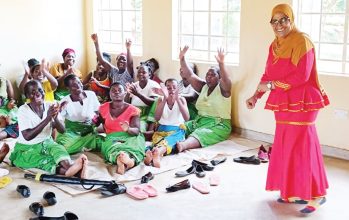Malawi, EU engage on budget, graft, other issues
Representatives of the Malawi Government and the European Union (EU) yesterday engaged in a political dialogue that tackled several sticky issues including corruption, governance, democracy, climate change management and budget support.
The bi-annual dialogue, according to a joint statement issued by the EU press office and Ministry of Foreign Affairs, discussed the issues based on mutual trust between the parties.
The Malawi delegation was led by Minister of Foreign Affairs Nancy Tembo while the EU Delegation was led by EU Ambassador Rune Skinnebach.
The statement reads in part: “The political dialogue addressed a series of topics relating to common values and positions on geo-political developments focusing on Russian aggression in Ukraine and regional developments and a shared assessment of outcomes of CoP27.”

During their meeting, the two sides also discussed political and economic situation, including prospects for Malawi to get an International Monetary Fund (IMF) nod on the Extended Credit Facility (ECF), democracy and human rights with a focus on access to justice and anti-corruption efforts and achievements.
The meeting also discussed reforms to the business climate and investment environment, agriculture, exports, cross-border trade under Africa Continental Free Trade Area and reinforcing synergies with the EU’s Global Gateway.
During the dialogue, the two parties further discussed partnership for development with focus on EU’s assessment on Malawi’s eligibility to budget support after a recent assessment by an EU team from Brussels, Belgium.
Tembo is quoted in the statement as having said the discussion on the possibility of resuming direct budgetary support underlined the recognition and appreciation by the EU on the progress which the government is making in the field of governance and public financial management, among others.
She further appealed to the EU to enable Malawi to benefit from its Global Gateway investment package, particularly in respect of regional transport corridors and other infrastructural projects and digitisation in order to reinforce synergies of cross border traders.
On the other hand, Skinnebach expressed confidence that the strong and long-lasting partnership between Malawi and the EU will constitute a solid foundation for pursuing shared strategic priorities.
He said: “I am heartened by the shared perspectives on many aspects covered by the dialogue. I am also thrilled to note the government’s determination in the fight against corruption, and the progress in many fields touched upon during the dialogue.”
Furthermore he expressed encouragement with regards to potentially providing budget support through the EU Multi-annual Indicative Programme for Malawi for the period 2021-27 if the outstanding macro-economic and public finance management issues are addressed.
Bringing back general budget support is one of the current administration’s broader strategies of shoring up Malawi’s fiscal envelope.
The government is also pushing for an ECF with the IMF and has said it is committed to tightening public finance management to save resources for ploughing back into the economy.
EU and other donors under what was called the Common Approach to Budget Support such as the World Bank and the United Kingdom stopped providing direct budgetary support to Malawi in September 2013 following revelations of Cashgate, the plunder of public resources at Capital Hill through inflated invoices, payment for goods and services not rendered or delivered and fraud.
The development left Malawi with a 40 percent hole in the recurrent budget and about 80 percent in the development budget as the donors opted to channel resources in form of off-budget support through international non-governmental organisations.
The EU had previously rejected calls for resumption, citing fears that public finance management systems were not robust enough.
But Minister of Finance and Economic Affairs Sosten Gwengwe, in an interview yesterday, said government continues to explore and work towards reforms that will culminate into resumption of direct budget support.
Besides Tembo, the Malawi Government delegation also comprised Minister of Justice Titus Mvalo, Minister of Natural Resources and Climate Change Eisenhower Mkaka, Minister of Trade and Industry Mark Katsonga Phiri, Deputy Minister of Transport and Public Works Nancy Chaola Mdooko, National Planning Commission director general Dr Thomas Munthali and other senior government officials.
On the other hand, the EU Delegation also comprised German Ambassador Ralph Timmermann, Ambassador of Ireland Seamus O’Grady, Finish Ambassador Saana Halinen, Dutch Ambassador Margret Verwijk, Portuguese Ambassador Miguel Calheiros Veloz, Belgian Ambassador Fanny Heylen and other senior officials from EU diplomatic missions.
Later yesterday, the EU Delegation meet President Lazarus Chakwera at Kamuzu Palace.





